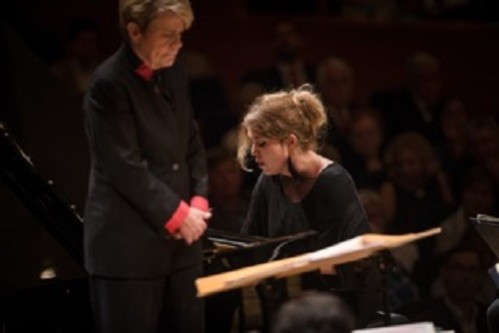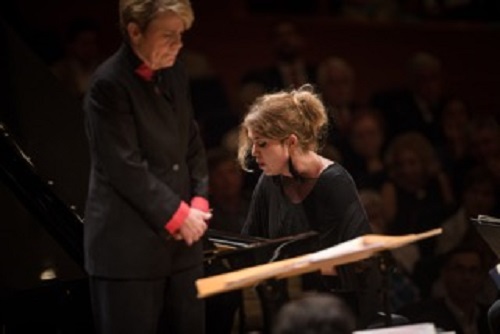 Switzerland Lucerne Festival (3) – Nobre, Grieg, Villa-Lobos, Rachmaninov: São Paulo Symphony Orchestra, Gabriela Montero (piano), Marin Alsop (conductor), Kultur- und Kongresszentrum (KKL), Lucerne 26.8.2016. (JR)
Switzerland Lucerne Festival (3) – Nobre, Grieg, Villa-Lobos, Rachmaninov: São Paulo Symphony Orchestra, Gabriela Montero (piano), Marin Alsop (conductor), Kultur- und Kongresszentrum (KKL), Lucerne 26.8.2016. (JR)

Nobre: “Kabbalah” for orchestra
Grieg: Piano Concerto
Villa-Lobos: From Bachiana brasiliera No. 4
Rachmaninov: Symphonic Dances
Only a few days after their appearance at the Proms (review) with the identical programme, this was a debut for both orchestra and conductor at the Lucerne Festival. Considering that this summer’s Festival is showcasing female musicians under the banner “Prima Donna”, the omission of someone of the calibre of Marin Alsop at the Festival in previous years ought to be rather an embarrassment, though it should be remembered that the Swiss only granted women the vote in federal elections in 1971, and no that’s not a misprint, 1971!
I was much taken by the first piece, the Swiss première of a short piece written in 2004 by Brazilian composer Marlos Nobre, who is seen as the successor in Brazil to Villa. Its title “Kabbalah” alludes to the Jewish tradition of mystic thought; I have to say I couldn’t fathom a link to the title from what I heard. The piece starts very intriguingly with clockwork ticking noises and then develops with great energy and rhythm – it went down very well with the whole audience.
It was a pleasure hearing the glories of Grieg’s Piano Concerto again, live; it has not been, I feel, at the forefront of concert programming for some while. Venezuelan pianist Gabriela Montero was most impressive in the lyrical passages of the slow movement and in the final movement, with playing of great delicacy. She was less impressive in the dynamic sections, when some wild abandon might have made the piece really lift off. The cadenza was finely rendered, though occasionally Montero’s fingers seem to stumble over themselves. By way of encore, Montero – donning dangly colourful earrings – did her party trick, namely asking the audience to sing a tune which she would then improvise. Not Land of Hope and Glory (as at the Proms), but as no-one dared to sing out (I held back), Montero suggested a well-known Latin chanson which turned into Jacques Loussier’s Bach.
The orchestra then came to life after the interval, with Villa-Lobos, which of course was very much in their blood. I suspect it was a real ear-opener to the Swiss. (The audience at the Lucerne Festival is multi-national, mainly from surrounding European countries, many combining concerts with a holiday in the beautiful surroundings.) The orchestra had fun and gave a very good account of themselves throughout; the flautist was, however, in a league of her own.
And then something very strange happened. One minute we were listening to Villa-Lobos and then, without hesitation, interruption, deviation or applause, we were listening to the Rachmaninov. Maestra Alsop (as the concert programme called her) appeared to have decided to merge the two pieces into one, to show their homogeneity. I was beginning to think the Villa-Lobos was going on rather a long time. When Alsop announced the encore “and now for something Brazilian”, many in the audience must have been confused, and wondered what had happened to the Rachmaninov. Perhaps the concert had been shortened, without announcement? (Mercifully the Swiss do not – yet – follow the new British example of clapping between movements, on which I have admittedly old-fashioned views, notwithstanding anything Stephen Hough may have to say on the subject.)
The two Brazilian encores went down a treat with the audience; the first was a raucous piece by Edu Lobo, the second a gentle waltz by Villa-Lobos. But most of all, it was Marin Alsop’s charisma and musicianship which were the best advocates for the “Prima Donna” series.
John Rhodes
